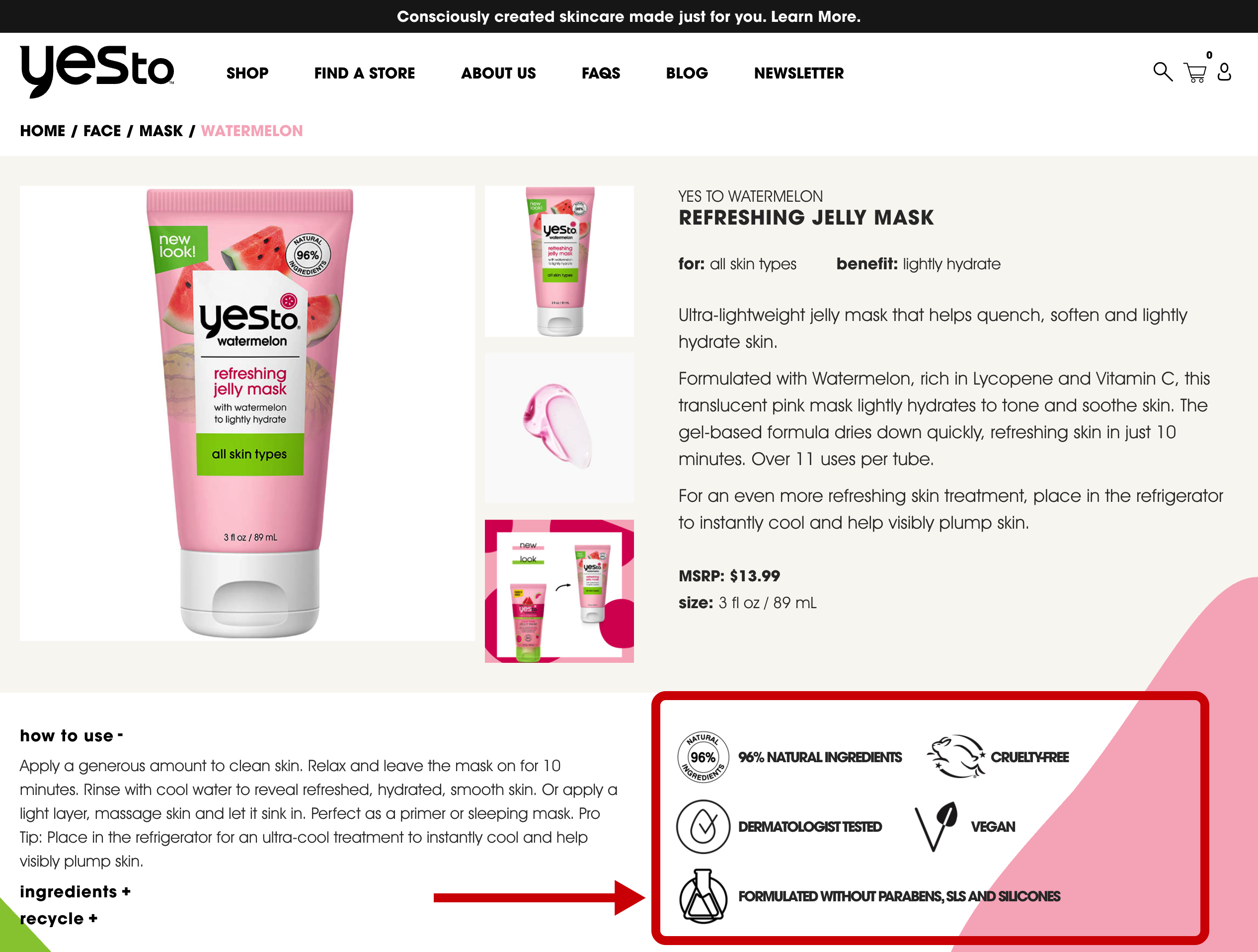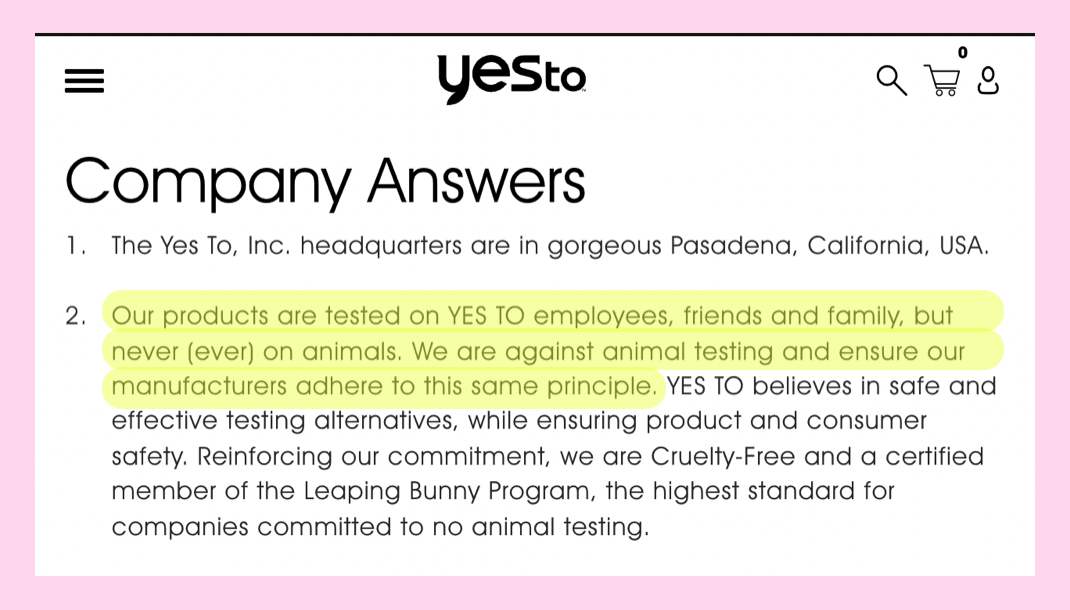Yes To cosmetics aims to use clean ingredients that you need for healthy skin, hair and nails. It wants to be accessible to everyone – but does it consider the importance of cruelty-free and vegan in the process?
Yes To is cruelty-free. It doesn't conduct animal testing on its products, nor does it distribute its cosmetics where animal testing is required by law. While Yes To does offer a range of vegan cosmetics, it is not considered a vegan brand.
Yes To was founded in the USA in 2006 by Ido Leffler and Lance Kalish. The brand only uses organically grown fruits and vegetables at the heart of all its formulations and promises noticeable results.
One of its biggest claims is that its products are made from at least 95% natural ingredients. All of its ranges are named after the namesake. For example, 'Yes To Watermelon'.
It only took three months post-launch for the brand to get a $3 million order from Walgreens, and it hasn't stopped growing since.
Before deciding on what to buy, here's what you need to know about Yes To's current animal testing policies, vegan ranges, formulation, and sustainability.
Is Yes To Cruelty-Free and Vegan?
Yes To is 100% Cruelty-Free
It does not:
Yes To has a solid cruelty-free message, and it shows. It has accreditation from Leaping Bunny – the only internationally recognized certification that guarantees a brand is cruelty-free.
The brand is also owned by San Fransisco Equity Partners, a private firm not known to be associated with animal testing.
This brings us to our next point:
Yes To is Not Vegan
Although the brand is not entirely vegan, Yes To has an extensive range of vegan products from which to choose.
Two of the most common animal-derived ingredients that Yes To uses are:
If you're interested in which products are vegan or finding vegan brand alternatives – keep reading or click on this link: Yes To vegan products.
Animal Testing Policy and History
Yes To has been committed to creating clean, effective and affordable cosmetics that are also cruelty-free. This has been its intention since it was founded.
Cruelty-Free Status in 2021
Here is a screenshot of Yes To's official statement regarding its cruelty-free policies and vegan products, taken from its website:
Certification
Yes To is Leaping Bunny certified.
While you might know PETA very well – it surprisingly doesn't hold the strictest cruelty-free regulations out there. It seems to only require a brand's written consent that abides by the PETA code of conduct.
Certification from Leaping Bunny is ideal because it holds rigorous standards and does regular audits to ensure they are upheld.
Leaping Bunny certification proves that:
If you see a bunny stamp at the back of your product bottle – that's an excellent sign. But don't be fooled by the image itself. A lot of brands are using fake logos to mislead consumers.
Do your homework and see which products are genuinely cruelty-free first. This article will help you: Which Cruelty-Free Logos Can You Trust?
Is Yes To Sold Where Animal Testing is Required By Law?
Yes To does not distribute any of its products to China or any country that requires animal testing on cosmetics by law.
China has a shocking track record. It is the country with the most amount of animal testing globally, with over 20 million animals used per year.
However, if you live in China or are concerned about its cruel beauty policies, there are a couple of loopholes to be aware of. Here's how to find cruelty-free cosmetics in China: Are Cosmetics Made in China Cruelty-Free?
What Yes To Products Are Vegan?
Yes To has an extensive range of vegan products that continues to grow.
To save you some time, here are some of Yes To's most popular and award-winning products to choose from:
Unfortunately, Yes To does not have a dedicated page for its vegan products. However, you can email customer service, and they will send you an extensive list telling you exactly what you want to know.
You can also scroll through Yes To's website and see which products are vegan once you've selected them.
Vegan Alternatives to Yes To
Overall, Yes To is a great option for vegans and provide great vegan alternatives that other brands haven't cared to try yet. They have a clean track record and noteworthy transparency with its consumers.
For a multi-million dollar brand – it's commendable.
But if you will not support a brand that isn't entirely vegan – Yes To might not be your first choice.
If you're looking for 100% vegan cosmetics that are in the same price range, here are some alternatives:
Is Yes To Natural and Organic?
Yes To is a natural brand. It claims to use a minimum of 95% natural ingredients in each product.
Although Yes To might use some organic ingredients, it is not certified organic, nor does it advertise itself as an organic cosmetics brand.
What are natural cosmetics?
The term "clean" or "natural" is not regulated for cosmetics and skincare. In other words, it doesn't hold one specific meaning.
In Yes To's case, it means a product is free of toxic synthetic ingredients and uses ingredients of immediate plant origin.
Here's the thing: "natural" is not always good. Just because an ingredient is natural (take chili peppers, for example) doesn't mean you should rub it on your skin.
Yes To does a great deal of research to know what natural ingredients work well with human skin and provide substantial health benefits.
Almost all products use a certain amount of synthetic ingredients in their formulas, and Yes To is no exception – but it can choose to use better or clean synthetics.
If a synthetic ingredient is "clean," it means it is safe and non-toxic for us. Its purpose is to preserve the stability of a beauty formulation.
Does Yes To Use Safe Ingredients?
Yes To has a clean range of ingredients. They also avoid using anything that could be harmful where possible.
As a conscientious shopper, you must read up on any brand's ingredient list before you make a purchase – especially if you live within the United States.
This is because the FDA has only banned or restricted 11 harmful chemicals from cosmetics within the country. Europe, on the other hand, has banned 1,328!
With skincare, here are some ingredients you really want to avoid:
According to Skin Safe, Yes To usually has an 82% - 91% allergen-free ranking for each product.
Most of Yes To's products are free of allergens such as common preservatives, irritants, gluten, nickel, fragrance, soy, and propylene glycol.
All of its products are free of parabens, MCI/MI, SLS, and silicones.
But reading the ingredient list is crucial because Yes To is not 100% hypoallergenic or non-comedogenic, even though many of its products are suitable for these skin concerns.
Are Cruelty-Free Ingredients Safe?
If you're worried about how safe it is to use cosmetics that are not tested on animals – please relax and take a sigh of relief.
There is no reason why cruelty-free products shouldn't be just as safe, if not safer, than anything tested on an animal.
Not only is it easy to test ingredients without using animals altogether, but there are so many pre-approved ingredients you can use to make cosmetics that there really is no need.
If you're interested, here's more on the subject: Are Cruelty-Free Cosmetics Safe?
Is Yes To Sustainable and Ethical?
Yes To has some strong sustainability and ethical initiatives as it ties in with the company values.
As it stands, the brand:
It's no secret that the world has a huge waste problem, and cosmetic brands are only making it worse by using unsustainable packaging and harmful ingredients.
Some of the ways Yes To is taking strong environmental accountability is by:
Final Thoughts
Yes To is a well-developed cosmetics brand that takes various ethical factors into consideration. The fact that they are cruelty-free is a step towards a more sustainable future in cosmetics.
We appreciate the fact that it has a transparent supply chain and is open to the public about its testing, purchasing, and distribution policies.
Of course, since Yes To is not 100% vegan – it might not be the best choice for activists who go the extra mile. Especially since the brand also uses palm oil as an ingredient. (Even if it's sustainably sourced.)
But we wouldn't shut it down so quickly if we were you. This young brand is developing and listening to your needs, so keep following its movements.


